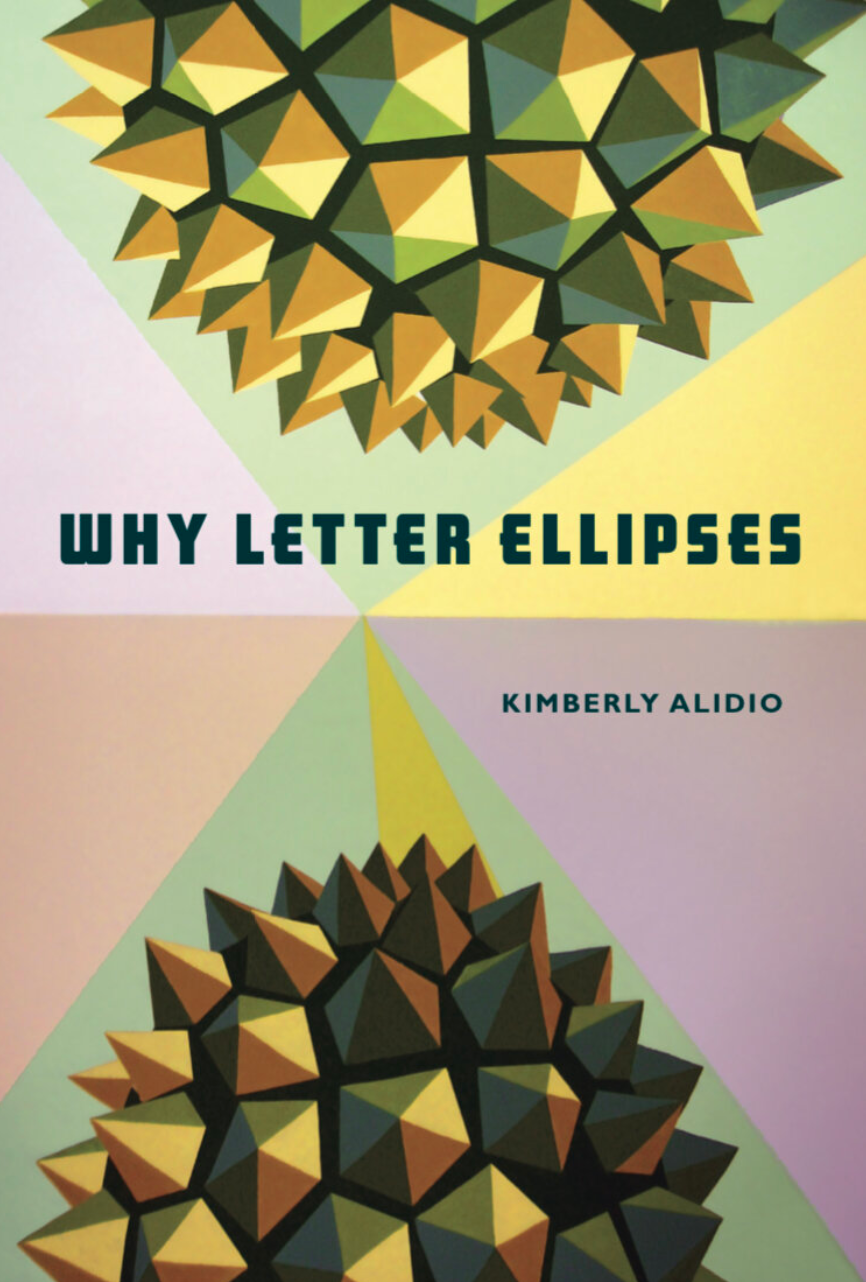Discussion with Kimberly Alidio: Why Letter Ellipses

Professor Fred Moten welcomes poet Kimberly Alidio to discuss her collection Why Letter Ellipses. They will be joined in conversation with Ronaldo Wilson, Jackie Wang and Edgar Garcia.
Praise for the collection:
Kimberly Alidio’s striking why letter ellipses poses the deep challenge of how “to relearn how to exist in and beyond this world” through the poem’s archive, textual, and reading experience; particularly how to turn away from the poem’s sublime lyric to a material reality in the letter and the word and its deliberate omissions. Early on, in “stitch” do we get a confession about the poem’s intentions (a la edgy Marianne Moore): “I also dislike literary devices! & only use them in impossible conversations.” But it’s in these “impossible conversations” that proliferate in their glory throughout the collection that we see how the poet and the historian meet to bear witness of the world’s mercurial devices; its also how the literary devices manifest: “my cheek against tercets” grounding us in the utterances of both beauty and alterity. Alidio’s world is the one I need to step into daily. I'm so grateful for this book.
—Prageeta Sharma
A voice — “a formerly pseudonymous avatar,” “your girl” — sometimes emerges from the insistently quotidian schist of Kimberly Alidio’s why letter ellipses. I think it’s this disembodied, omniscient, kind of scary voice (“who is shaking me/I cried”) that organizes the eye and ear to move through Alidio’s wordplay, a rough shuffle, nudging or sweeping words into a new kind of history writing that is both gentle and bitter. The poems’ many shapes, many ideas, many apparently random flourishes cluster around a rich sticky center that is a technique of accounting. Alidio’s accountability, then, forms something natural. A sunflower. No, a hive. —Simone White
PANELIST BIOS:
Kimberly Alidio is the author of : once teeth bones coral : (a 2021 Lambda Literary Finalist), a cell of falls, and After projects the resound. Her forthcoming project, Ambient Mom, is an interdisciplinary work of translingual poetry, concrete poetry, essay, digital archive, and sound poetry recordings. Alidio was Assistant Professor of History and Asian American Studies at the University of Texas, Zora Neale Hurston Scholar at Naropa University’s Jack Kerouac School, and Asian American Studies Postdoctoral Fellow at the University of Illinois. She holds a PhD in History from the University of Michigan, and, in May 2021, will receive a MFA in Creative Writing from the University of Arizona. At present, she lives between Tucson, AZ and Catskill, NY. why letter ellipses is her third book of poetry.
Edgar Garcia is a poet and scholar of the hemispheric cultures of the Americas. He is the author of Skins of Columbus: A Dream Ethnography (Fence Books, 2019); Signs of the Americas: A Poetics of Pictography, Hieroglyphs, and Khipu (University of Chicago Press, 2020); Emergency: Reading the Popol Vuh in a Time of Crisis (forthcoming, University of Chicago Press, 2021); and, with visual artist Eamon Ore-Giron, Infinite Regress (Bom Dia Books, 2020). He is currently working on books about risk analysis and divination; the Cantares Mexicanos; and the mytheme of Atlantis. He is the Neubauer Family Assistant Professor of English at the University of Chicago, where he also teaches in the department of Creative Writing.
Jackie Wang is a scholar, abolitionist, poet, multimedia artist, and Assistant Professor of Culture and Media Studies at The New School’s Eugene Lang College. She is the author of Carceral Capitalism (2018), a book on the racial, economic, political, legal, and technological dimensions of the U.S. carceral state. Her creative work includes the poetry collection, The Sunflower Cast a Spell to Save Us from the Void (Nightboat Books, 2021) and the forthcoming experimental essay collection Alien Daughters Walk Into the Sun (Semiotexte).
Ronaldo V. Wilson, PhD, is the author of: Narrative of the Life of the Brown Boy and the White Man (University of Pittsburgh Press, 2008), winner of the Cave Canem Prize; Poems of the Black Object (Futurepoem, 2009), winner of the Thom Gunn Award for Gay Poetry and the Asian American Literary Award in Poetry. His latest books are Farther Traveler: Poetry, Prose (Counterpath Press, 2014), finalist for a Thom Gunn Award for Gay Poetry, Lucy 72 (1913 Press, 2018); and two forthcoming books Carmelina, Figures: An Artist’s Book (Wendy’s Subway, 2021), and a book of stories, Virgil Kills (Nightboat Books, 2022). Co-founder of the Black Took Collective, Wilson is, too, a mixed media artist, dancer and performer. He has performed in multiple venues, including the Pulitzer Arts Foundation, UC Riverside’s Artsblock, Georgetown’s Lannan Center, the Atlantic Center for the Arts, Louisiana State University’s Digital Media Center Theater, Southern Exposure Gallery, and Casa Victoria Ocampo in Buenos Aires. The recipient of fellowships from The Robert Rauschenberg Foundation, Cave Canem, the Djerassi Resident Artists Program, the Ford Foundation, Kundiman, MacDowell, the National Research Council, the Provincetown Fine Arts Work Center, the Center for Art and Thought (CA+T), and Yaddo, and is Professor of Creative Writing and Literature at the University of California, Santa Cruz, serving on the core faculty of the Creative Critical PhD Program, and principal faculty member of CRES (Critical Race and Ethnic Studies).